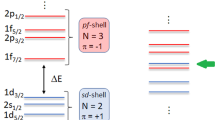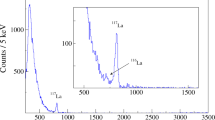Abstract
Most naturally-occurring heavy isotopes (A ≥ 74) are believed to be synthesized by the slow (s−) and rapid (r−) neutron capture processes1, with the rest (some 30 neutron-deficient isotopes including 180Ta) being conventionally classified as p-process elements. The very rare isotope 180Ta (a nuclear isomeric state 180Tam with a half-life ≥ 3×1013 yr)2,3 is of particular astrophysical interest because of its uncertain origin. Various p-process models4–6 (except the one eventually proposed in ref. 7) apparently fail to account even for the extremely small (2.78 × 10−6 per 106 Si atoms) solar abundance8. Another example of this kind is 138La. While preserving other more specific mechanisms (such as the cosmic-ray spallation reactions9,10, or the local proton irradiation in the early Solar System11,12) for the possible origin (s) of these rare isotopes, we show here that a significant amount of 180Tam may indeed be produced in the s-process.
This is a preview of subscription content, access via your institution
Access options
Subscribe to this journal
Receive 51 print issues and online access
$199.00 per year
only $3.90 per issue
Buy this article
- Purchase on Springer Link
- Instant access to full article PDF
Prices may be subject to local taxes which are calculated during checkout
Similar content being viewed by others
References
Burbidge, E. M., Burbidge, G. R., Fowler, W. A. & Hoyle, F. Rev. mod. Phys. 29, 547–650 (1957).
Sharma, K. S. et al. Phys. Lett. 91B, 211–213 (1980).
Norman, E. B. Phys. Rev. C24, 2334–2336 (1981).
Audouze, J. & Truran, J. W. Astrophys. J. 202, 204–213 (1975).
Arnould, M. Astr. Astrophys. 46, 117–125 (1976).
Woosley, S. E. & Howard, W. M. Astrophys. J. Suppl. 36, 285–304 (1978).
Harrison, T. G. Astrophys. J. Suppl. 36, 199–216 (1978).
Anders, E. & Ebihara, M. Geochim cosmochim. Acta 46, 2363–2380 (1982).
Audouze, J. Astr. Astrophys. 8, 436–457 (1970).
Hainebach, K. L., Schramm, D. N. & Blake, J. B. Astrophys. J. 205, 920–930 (1976).
Clayton, D. D., Dwek, E. & Woosley, S. E. Astrophys. J. 214, 300–315 (1977).
Lee, T. Astrophys. J. 224, 217–226 (1978).
Beer, H. & Ward, R. A. Nature 291, 308–310 (1981).
Burghardt, B., Harzer, R., Hoeffgen, H. J. & Meisel, G. Phys. Lett. 92B, 64–66 (1980).
Warde, E. et al. Phys. Rev. C27. 98–112 (1983).
Norman, E. B. & Kellogg, S. Contr. int. Workshop on Nuclear Astrophysics, Tegernsee (1983).
Ward, R. A. & Fowler, W. A. Astrophys. J. 238, 266–286 (1980).
Ward, R. A. Astr. Astrophys. 97, 157–168 (1981).
Clayton, D. D., Fowler, W. A., Hull, T. E. & Zimmerman, B. A. Ann. Phys. 12, 331–408 (1961).
Käpieler, F. et al. Astrophys. J. 257, 821–846 (1982).
Takahashi, K. & Yokoi, K. Nucl. Phys. A404, 578–598 (1983).
Lederer, C. M. & Shirley, V. S. (eds) Table of Isotopes 7th edn (Wiley, New York, 1978).
Blatt, J. M. & Weisskopf, V. F. Theoretical Nuclear Physics (Wiley, New York, 1952).
Alaga, G. Nucl. Phys. 4, 625–631 (1957).
Daudel, R., Benoist, P., Jacques, R. & Jean, M. C.r. hebd. Séanc. Acad. Sci., Paris 224, 1427–1429 (1947).
Bahcall, J. N. Phys. Rev. 124, 495–499 (1961).
Beer, H. & Macklin, R. L. Phys. Rev. C26, 1404–1416 (1982).
Holmes, J. A., Woosley, S. E., Fowler, W. A. & Zimmerman, B. A. Atomic Data Nucl. Data Tables 18, 305–412 (1976).
Reffo, G., Fabbri, F., Wisshak, K. & Käppeler, F. Nucl. Sci. Engng 80, 630–647 (1982).
Ulrich, R. K. in Essays in Nuclear Astrophysics (eds C. A. Barnes, D. D. Clayton & D. N. Schramm) 301–323 (Cambridge University Press, 1982).
Arnould, M., Takahashi, K. & Yokoi, K. Astr. Astrophys. (submitted).
Iben, I. Jr Astrophys. J. 217, 788–798 (1977).
Cosner, K., Iben, I. Jr & Truran, J. W. Astrophys. J. Lett. 238, L91–L96 (1980).
Beer, H., Käppeler, F., Yokoi, K. & Takahashi, K. Astrophys. J. (submitted).
Käppeler, F. Contr. int. Workshop on Nuclear Astrophysics, Tegernsee (1983).
Ryves, T. B. J. Phys. G6, 763–769 (1980).
Author information
Authors and Affiliations
Rights and permissions
About this article
Cite this article
Yokoi, K., Takahashi, K. Slow neutron capture origin for 180Tam. Nature 305, 198–200 (1983). https://doi.org/10.1038/305198a0
Received:
Accepted:
Issue Date:
DOI: https://doi.org/10.1038/305198a0
This article is cited by
-
Thep-nuclei: abundances and origins
The Astronomy and Astrophysics Review (1992)
-
Measurement of the?-decay branch in180Lu to180m Hf for Investigation of the r-process nucleosynthesis of180m Ta
Zeitschrift f�r Physik A Atoms and Nuclei (1984)
Comments
By submitting a comment you agree to abide by our Terms and Community Guidelines. If you find something abusive or that does not comply with our terms or guidelines please flag it as inappropriate.



